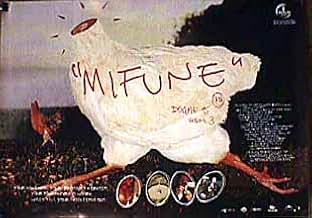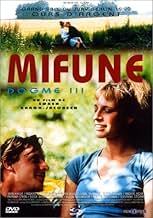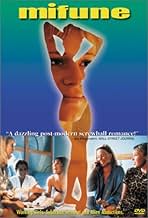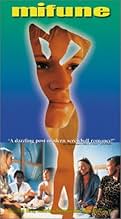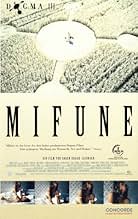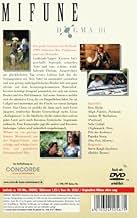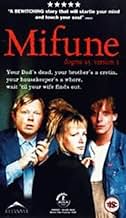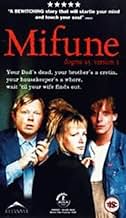NOTE IMDb
7,1/10
8,3 k
MA NOTE
À son insu, un homme d'affaires engage une prostituée fugitive pour s'occuper de son frère handicapé.À son insu, un homme d'affaires engage une prostituée fugitive pour s'occuper de son frère handicapé.À son insu, un homme d'affaires engage une prostituée fugitive pour s'occuper de son frère handicapé.
- Réalisation
- Scénario
- Casting principal
- Récompenses
- 10 victoires et 14 nominations au total
Søren Fauli
- Stemmen
- (voix)
Kjeld Nørgaard
- Claires far
- (as Keld Nørgaard)
Avis à la une
I didn't know much about this movie going in, but I got a very nice surprise. The Kresten plot -- a yuppie summoned home to deal with his redneck past by the death of his father -- could have been a dull family drama, but this movie was much better than that. It turns out that he has a number of things about his past that he's kept secret from the people in his city life -- his retarded brother, the badly run-down farm he grew up on, and more. Some of his story is serious, and much is played for humor, with good taste separating the drama and humor.
The Liva plot -- a woman escaping prostitution into an honest common job -- was completely opposite the Hollywood presentation of prostitution. (Hollywood either glamorizes it, uses it as an opportunity to add gratuitous sex before switching to the gratuitous violence.) Liva's prostitution pays fairly well, but it's clearly miserable, degrading, full of fear, and sometimes danger. The movie shows why she wants out with understated drama -- instead of rubbing her misery in our faces, it shows us hints of it, but leaves room for us to imagine just how bad it is for her.
When Liva escapes prostitution with a job as Kresten's housekeeper, the her part in the movie switches from drama to comedy, in the form of funny situations and events that feel natural, rather than contrived gag situations.
The acting was very good, particular Iben Hjejle's portrayal of Liva. Anders W. Berthelsen played Kresten well, and Emil Tarding's smaller role as Liva's young brother Bjarke was also very good.
I had never heard of the Dogme film series until after seeing this movie. The only one Dogme rule that really matters to the movie was that the plot must stick to real life and avoid superficial violence. That demanded a plot where the characters and story matter, and Søren Kragh-Jacobsen delivered. The simple camera work, natural lighting, minimal set dressing, etc., didn't improve the movie. But neither did the simple movie-making detract from the quality -- they deserve praise for doing so well within their rules of simplicity. One additional benefit of the movie-making simplicity rules was that it kept the budget low, so that more good movies like this could be made.
The Liva plot -- a woman escaping prostitution into an honest common job -- was completely opposite the Hollywood presentation of prostitution. (Hollywood either glamorizes it, uses it as an opportunity to add gratuitous sex before switching to the gratuitous violence.) Liva's prostitution pays fairly well, but it's clearly miserable, degrading, full of fear, and sometimes danger. The movie shows why she wants out with understated drama -- instead of rubbing her misery in our faces, it shows us hints of it, but leaves room for us to imagine just how bad it is for her.
When Liva escapes prostitution with a job as Kresten's housekeeper, the her part in the movie switches from drama to comedy, in the form of funny situations and events that feel natural, rather than contrived gag situations.
The acting was very good, particular Iben Hjejle's portrayal of Liva. Anders W. Berthelsen played Kresten well, and Emil Tarding's smaller role as Liva's young brother Bjarke was also very good.
I had never heard of the Dogme film series until after seeing this movie. The only one Dogme rule that really matters to the movie was that the plot must stick to real life and avoid superficial violence. That demanded a plot where the characters and story matter, and Søren Kragh-Jacobsen delivered. The simple camera work, natural lighting, minimal set dressing, etc., didn't improve the movie. But neither did the simple movie-making detract from the quality -- they deserve praise for doing so well within their rules of simplicity. One additional benefit of the movie-making simplicity rules was that it kept the budget low, so that more good movies like this could be made.
A movie to fall in love with. Simple as that. A tender, sweet love story that will make your heart melt (I know how terribly cheesy that sounds, but I stand by my words), unless your heart is made of stone. It's another Danish masterpiece and yet another Dogme movie (but don't worry; once you get used to the shaky cam, these films are all richly rewarding). 8 stars out of 10.
In case you're interested in more underrated film gems, here's some of my favorites:
imdb.com/list/ls070242495
In case you're interested in more underrated film gems, here's some of my favorites:
imdb.com/list/ls070242495
This was the first film I had seen from the Dogma series and I didn't know quite what to expect. Mifune is actually a very moving and personal insight into the life styles of a small handfull of characters. The acting in the movie is superb and it follows the rules of dogma down to a tee (natural lighting, no sound effects etc.). The film at face value is also very funny, although the source of comedy is rather disturbing. This is a film that will stay fresh in your mind long after you leave the cinema. 7/10.
Mifune starts off a little slow and at first you are really not sure where it is going. Thankfully this does not last for long. The characters have many dimenions and the viewer quickly cares and grows more curiousity towards the characters. Yes, many of the Dogme 95 guildlines are in this film however (must like Festen... another fabulous film) it is the story that makes this such a great film.
All characters in this film are completly different from eachother. The dialouge itself is not what makes this film great, it's the story of all these people combined.
Dogme films often show things that an American audience may have a hard time dealing with. If seeing something and learning from something that Americans can hide from is something that holds an interest than I highly recommend this film.
All characters in this film are completly different from eachother. The dialouge itself is not what makes this film great, it's the story of all these people combined.
Dogme films often show things that an American audience may have a hard time dealing with. If seeing something and learning from something that Americans can hide from is something that holds an interest than I highly recommend this film.
Despite the Dogme trappings, there is a story here. It is about lying and its consequences.
Kresten, a young go-go company man is marrying the boss's daughter, but hides, then fabricates his country past. He doesn't get away with it for long and ends up shamed and divorced. Likewise, a young prostitute, Liva, tries to flee her surroundings, but they follow her and in the end visit - literally - wrath on her new home.
The only spiritually pure character, content in his surroundings, too innocent of wit to lie, is Kresten's retarded brother Rud. It seems that everything he says, no matter how far-fetched, turns out to be true. He is also the teacher of kindness who, since he is inarticulate, can only teach by example.
Actually, I think the most unambiguously satisfying relationship here is between Rud and Liva's beastly little brother Bjarke. It is Bjarke who can't handle the truth about himself and his sister. Quickly, the stereotypes he has learned to brutalize in the social Darwinian hell of boarding school confront him with their humanity and teach him that life doesn't have to be the daily exercise in cynicism that he and his sister suppose.
There is atonement for all three, visited in different forms, but ultimately redeeming and providing a hopeful ending to the story.
Unfortunately, there are a few problems in Mifune which marred my viewing. A major one is the text, which is badly abused in translation to English. For some reason, the translator has seen fit to turn words which in Danish mean "damn" or "hell" into "f**k". Perhaps he or she thought it would give the dialog more impact. He or she was wrong.
Another problem is the unresolved and perhaps unnecessary character of the ugly and despicable Gerner, whose purpose I'm not exactly sure of, other than as a kind of agent of punishment - perhaps a devil - descending on the hapless Kresten. In any case, we need at least to know more about him, or perhaps even have him whacked or otherwise disposed of for dramatic purposes.
Anyway, as with most European movies, "Mifune" is more about character than story. I strongly recommend that you meet Kresten, Rud, Liva and Bjarke. I think you'll like them in the end.
Kresten, a young go-go company man is marrying the boss's daughter, but hides, then fabricates his country past. He doesn't get away with it for long and ends up shamed and divorced. Likewise, a young prostitute, Liva, tries to flee her surroundings, but they follow her and in the end visit - literally - wrath on her new home.
The only spiritually pure character, content in his surroundings, too innocent of wit to lie, is Kresten's retarded brother Rud. It seems that everything he says, no matter how far-fetched, turns out to be true. He is also the teacher of kindness who, since he is inarticulate, can only teach by example.
Actually, I think the most unambiguously satisfying relationship here is between Rud and Liva's beastly little brother Bjarke. It is Bjarke who can't handle the truth about himself and his sister. Quickly, the stereotypes he has learned to brutalize in the social Darwinian hell of boarding school confront him with their humanity and teach him that life doesn't have to be the daily exercise in cynicism that he and his sister suppose.
There is atonement for all three, visited in different forms, but ultimately redeeming and providing a hopeful ending to the story.
Unfortunately, there are a few problems in Mifune which marred my viewing. A major one is the text, which is badly abused in translation to English. For some reason, the translator has seen fit to turn words which in Danish mean "damn" or "hell" into "f**k". Perhaps he or she thought it would give the dialog more impact. He or she was wrong.
Another problem is the unresolved and perhaps unnecessary character of the ugly and despicable Gerner, whose purpose I'm not exactly sure of, other than as a kind of agent of punishment - perhaps a devil - descending on the hapless Kresten. In any case, we need at least to know more about him, or perhaps even have him whacked or otherwise disposed of for dramatic purposes.
Anyway, as with most European movies, "Mifune" is more about character than story. I strongly recommend that you meet Kresten, Rud, Liva and Bjarke. I think you'll like them in the end.
Le saviez-vous
- AnecdotesAfter the movie's completion, director Søren Kragh-Jacobsen made the following statement: "As one of the DOGME 95 brethren and co-signatory of the Vow of Chastity, I feel moved to confess to the following transgressions of the aforesaid Vow during the production of Dogme 3 - Mifune. Please note that the film has been approved as a Dogme work, as only one genuine breach of the rules has actually taken place. The rest may be regarded as moral breaches: (1) I confess to having made one take with a black drape covering a window. This is not only the addition of a property, but must also be regarded as a kind of lighting arrangement. (2) I confess to moving furniture and fittings around the house. (3) I confess to having taken with me a number of albums of my favorite comic book series as a youth, Linda & Valentin (Valérian and Laureline). (4) I confess to helping to chase the neighbor's free-range hens across our location and including them in the film. (5) I confess that I brought a photographic image from an old lady from the area and hung it in a prominent position in one scene: not as part of the plot, but more as a selfish, spontaneous, pleasurable whim. (6) I confess to borrowing a hydraulic platform from a painter, which we used for the only two bird's-eye overview shots in the film. (7) I do solemnly declare that in my presence the remainder of Dogme 3 - Mifune was produced in accordance with the vow of chastity. (8) I also point out that the film has been approved by DOGME 95 as a Dogme film, as in real terms no more than a single breach of the rules has been committed. The rest may be regarded as moral transgressions."
- Citations
Liva Psilander: Livet er en lang lort, som man skal tage en kæmpe bid af hver dag!
- ConnexionsFeatured in Bag kameraet: Mifunes sidste sang (1999)
Meilleurs choix
Connectez-vous pour évaluer et suivre la liste de favoris afin de recevoir des recommandations personnalisées
- How long is Mifune?Alimenté par Alexa
Détails
- Date de sortie
- Pays d’origine
- Sites officiels
- Langue
- Aussi connu sous le nom de
- Mifune
- Lieux de tournage
- Sociétés de production
- Voir plus de crédits d'entreprise sur IMDbPro
Box-office
- Montant brut aux États-Unis et au Canada
- 512 434 $US
- Montant brut mondial
- 512 434 $US
Contribuer à cette page
Suggérer une modification ou ajouter du contenu manquant


